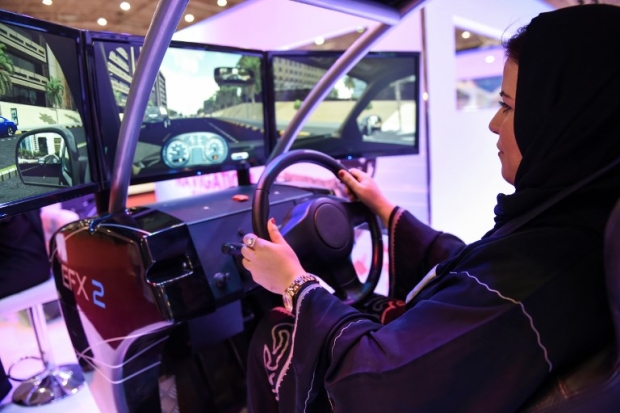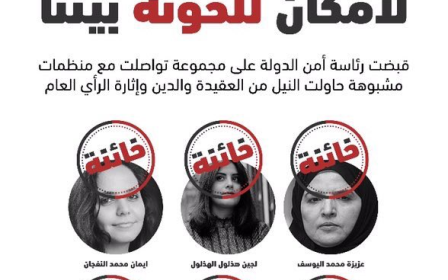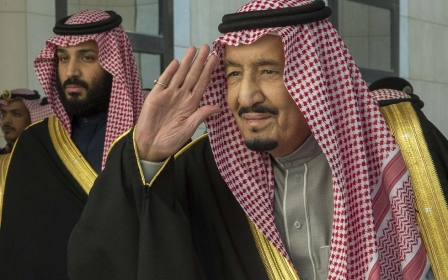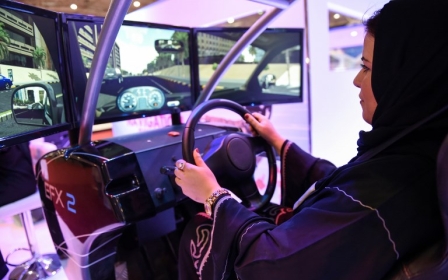Detained Saudi women's rights activists could face death penalty - report
Seven detained Saudi women’s rights activists, who campaigned for the ban on women driving to be lifted, may face the death penalty, newspaper Okaz reported on Sunday.
According to Saudi lawyers and judges, the prominent women’s rights activists, who were arrested last week and branded as "traitors" by government-aligned media outlets, may be sentenced to death should investigations result in the charge of treason and conspiracy against the state.
A Saudi activist, who did not wish to be named due to fears for their own safety, told Middle East Eye: “What we are seeing is that there is no tolerance of any kind for any type of [activist] activity.
“It is meant to send a clear message to the people that no one is supposed to speak on public affairs, nobody is supposed to be part of any engagement in society other than the state.”
A Saudi government statement said that the seven had been arrested for offering financial support to enemies abroad and suspicious contact with foreign entities. The statement also accused them of working together in “an organised manner to violate religious and national values”, without naming the detainees.
Rights groups have called on the authorities to release the detainees. Six of them have been identified as Eman al-Nafjan, Lujain al-Hathloul, Aziza al-Yousef, Aisha al-Manea, Ibrahim Modeimigh and Mohammed al-Rabea.
The activists, both women and men, have campaigned for a woman's right to drive, which the conservative kingdom is set to grant from next month after banning it for decades.
Progress stalled
The decision to lift the ban was hailed by many as proof of a new progressive trend in the country under the leadership of Crown Prince Mohammed bin Salman (MBS), who has presented himself as a reformist. At the same time, MBS has been at the helm of a crackdown on dissent, which has seen scores imprisoned, tortured and stripped of their assets.
Samah Hadid, Amnesty's Middle East director of campaigns, said on Monday: "Despite international outcry and calls for the release of these activists, they still remain detained for their peaceful human rights work."
"It is clear that underneath all the PR hype and spin, Crown Prince Mohammed bin Salman's reforms exclude human rights activism... We continue to call for the immediate and unconditional release of all activists still being detained solely for their human rights work."
'Underneath all the PR hype and spin, Crown Prince Mohammed bin Salman's reforms exclude human rights activism'
- Samah Hadid, Amnesty International
A hashtag has begun circulating on social media accusing the detainees of being 'agents of embassies', along with an image of the activists with the word 'traitor' stamped over their heads - language repeatedly used in connection with them in the Saudi media.
"The kind of reporting we see in the national media inside Saudi Arabia is aimed to quiet dissent inside, and to incite terror inside anyone who was inspired by these women," the anonymous activist said.
Human rights groups questioned Saudi Crown Prince Mohammed bin Salman's reform agenda on Saturday following the arrests.
"Crown Prince Mohammed bin Salman’s 'reform campaign' has been a frenzy of fear for genuine Saudi reformers who dare to advocate publicly for human rights or women’s empowerment," said Sarah Leah Whitson, Middle East director at Human Rights Watch.
"The message is clear that anyone expressing skepticism about the crown prince's rights agenda faces time in jail."
The anonymous activist believes now is a particularly dangerous time for outspoken Saudis, and said the authorities' crackdown reveals MBS' apparent reformist instincts are hollow.
“Why are you [MbS] shutting out anyone who wants to be part of this reformative approach? Unless of course it’s not really reformative…” the activist said.
Death penalty
Saudi Arabia has carried out nearly 600 executions since the beginning of 2014, according to Human Rights Watch.
The group has documented several cases in which Saudi courts have given out death sentences following “unfair trials”.
While the kingdom has ratified the Arab Charter on Human Rights, which requires that the death penalty only be used for the “most serious crimes” and in exceptional circumstances, Saudi Arabia applies the death penalty to a number of offenses, including nonviolent drug offences and sorcery.
“It’s bad enough that Saudi Arabia executes so many people, but many of them have not committed a violent crime,” Whitson said in an April report on 48 people executed since January. Half of those executed were charged with nonviolent drug offences.
Saudi Arabia has one of the highest execution rates in the world.
According to the anti-death penalty rights group Reprieve, Saudi Arabia's execution rate has doubled since Mohammed bin Salman was appointed crown prince in 2017.
The group said in March that 133 executions have taken place in the eight months since his appointment last June, compared with 67 in the eight months before.
It said several of those on death row in Saudi Arabia were convicted of crimes while still children.
'Mohammed bin Salman is one of the most brutal leaders in the kingdom’s recent history'
- Maya Foa, Reprieve
Maya Foa, the group's director, said: "The doubling of executions under the new crown prince reveals that, beneath his glossy public image, Mohammed bin Salman is one of the most brutal leaders in the kingdom’s recent history.
"Protesters, including some who were children at the time, have had the death penalty confirmed despite allegations of torture and forced confessions."
New MEE newsletter: Jerusalem Dispatch
Sign up to get the latest insights and analysis on Israel-Palestine, alongside Turkey Unpacked and other MEE newsletters
Middle East Eye delivers independent and unrivalled coverage and analysis of the Middle East, North Africa and beyond. To learn more about republishing this content and the associated fees, please fill out this form. More about MEE can be found here.





